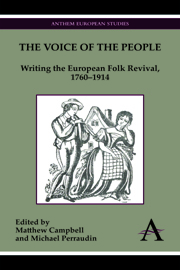Book contents
- Frontmatter
- Table of Contents
- List of Figures
- Introduction
- Chapter 1 The Impact of Ossian: Johann Gottfried Herder's Literary Legacy
- Chapter 2 On Robert Burns: Enlightenment, Mythology and the Folkloric
- Chapter 3 The Classical Form of the Nation: The Convergence of Greek and Folk Forms in Czech and Russian Literature in the 1810s
- Chapter 4 Literary Metamorphoses and the Reframing of Enchantment: The Scottish Song and Folktale Collections of R. H. Cromek, Allan Cunningham and Robert Chambers
- Chapter 5 Thomas Moore, Daniel Maclise and the New Mythology: The Origin of the Harp
- Chapter 6 The Oral Ballad and the Printed Poem in the Portuguese Romantic Movement: The Case of J. M. da Costa e Silva's Isabel ou a Heroina de Aragom
- Chapter 7 Class, Nation and the German Folk Revival: Heinrich Heine, Georg Büchner and Georg Weerth
- Chapter 8 The Estonian National Epic, Kalevipoeg: Its Sources and Inception
- Chapter 9 The Latvian Era of Folk Awakening: From Johann Gottfried Herder's Volkslieder to the Voice of an Emergent Nation
- Chapter 10 From Folklore to Folk Law: William Morris and the Popular Sources of Legal Authority
- Chapter 11 Pioneers, Friends, Rivals: Social Networks and the English Folk-Song Revival, 1889–1904
- Chapter 12 The Bosnian Vila: Folklore and Orientalism in the Fiction of Robert Michel
- Epilogue: The Persistence of Revival
- Bibliography
- Index
- List of Contributors
Chapter 7 - Class, Nation and the German Folk Revival: Heinrich Heine, Georg Büchner and Georg Weerth
Published online by Cambridge University Press: 05 July 2012
- Frontmatter
- Table of Contents
- List of Figures
- Introduction
- Chapter 1 The Impact of Ossian: Johann Gottfried Herder's Literary Legacy
- Chapter 2 On Robert Burns: Enlightenment, Mythology and the Folkloric
- Chapter 3 The Classical Form of the Nation: The Convergence of Greek and Folk Forms in Czech and Russian Literature in the 1810s
- Chapter 4 Literary Metamorphoses and the Reframing of Enchantment: The Scottish Song and Folktale Collections of R. H. Cromek, Allan Cunningham and Robert Chambers
- Chapter 5 Thomas Moore, Daniel Maclise and the New Mythology: The Origin of the Harp
- Chapter 6 The Oral Ballad and the Printed Poem in the Portuguese Romantic Movement: The Case of J. M. da Costa e Silva's Isabel ou a Heroina de Aragom
- Chapter 7 Class, Nation and the German Folk Revival: Heinrich Heine, Georg Büchner and Georg Weerth
- Chapter 8 The Estonian National Epic, Kalevipoeg: Its Sources and Inception
- Chapter 9 The Latvian Era of Folk Awakening: From Johann Gottfried Herder's Volkslieder to the Voice of an Emergent Nation
- Chapter 10 From Folklore to Folk Law: William Morris and the Popular Sources of Legal Authority
- Chapter 11 Pioneers, Friends, Rivals: Social Networks and the English Folk-Song Revival, 1889–1904
- Chapter 12 The Bosnian Vila: Folklore and Orientalism in the Fiction of Robert Michel
- Epilogue: The Persistence of Revival
- Bibliography
- Index
- List of Contributors
Summary
Volk is an ambiguous word in German, torn between the social and the national. The fact that the term could be an ideological keyword both for Nazism – with its Volksgenosse, Volksgemeinschaft, Volksgerichtshof, Volkssturm – and shortly afterwards for the East German communist state – Volkspolizei, Volkskammer, Volksarmee, Volkseigentum – points to the word's flexibility – but also to its power in German as a signal of that with which one should identify. In the parlance of the ideologically hazier modern Federal Republic, ‘Volk’ still appears in key political compounds: the leading parties call themselves ‘Volksparteien’ – indicating simultaneously their non-regionality and the breadth of their social appeal; Germany's biggest daily newspaper consistently terms itself a ‘Volkszeitung’; referendum votes are Volksabstimmungen or Volksentscheide; the census is a Volkszählung.
Other languages, it is true, are not entirely without such ambiguities. ‘People’, ‘peuple’ also have semantic uncertainties; but they are weaker words, standardly supplemented with adjectival or other glosses (the common people, ordinary people, the British people) or supplanted by more specific synonyms (folk, popular, proletarian, mass) which delimit meaning. German ‘Volk’, on its own or in compounds, can encompass all these connotations – and betray the tensions between them.
Volk in either of its nineteenth-century senses, social or national, is a Platonic idea, an imagined ideal entity which reality in its complexity may aspire to become. Who is the Volk? All of us except the aristocracy, says the poet and novella-author Theodor Storm in the early 1860s.
- Type
- Chapter
- Information
- The Voice of the PeopleWriting the European Folk Revival, 1760–1914, pp. 103 - 122Publisher: Anthem PressPrint publication year: 2012



